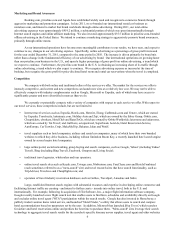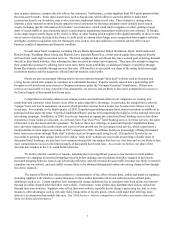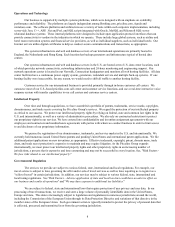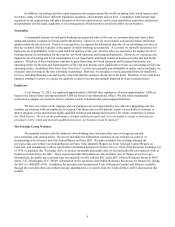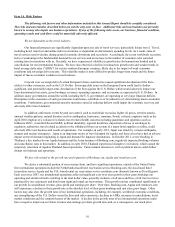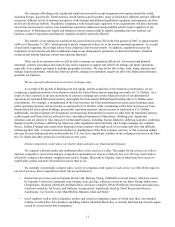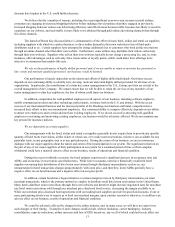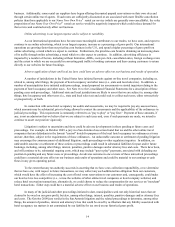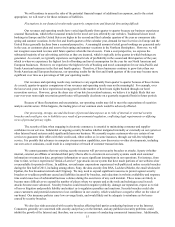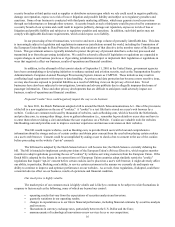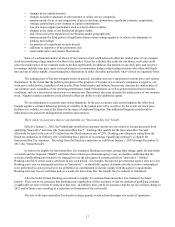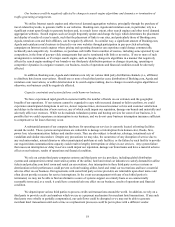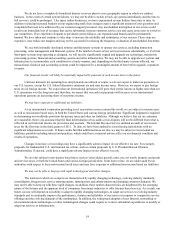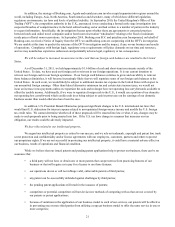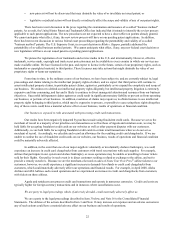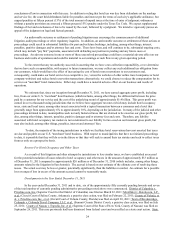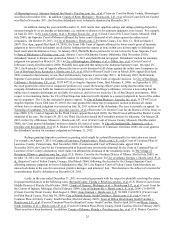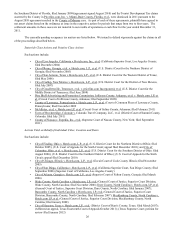Priceline 2011 Annual Report Download - page 17
Download and view the complete annual report
Please find page 17 of the 2011 Priceline annual report below. You can navigate through the pages in the report by either clicking on the pages listed below, or by using the keyword search tool below to find specific information within the annual report.16
security breaches at third parties such as supplier or distributor systems upon which we rely could result in negative publicity,
damage our reputation, expose us to risk of loss or litigation and possible liability and subject us to regulatory penalties and
sanctions. Some of our business is conducted with third party marketing affiliates, which may generate travel reservations
through our infrastructure or through other systems. A security breach at such a third party could be perceived by consumers as
a security breach of our systems and could result in negative publicity, damage our reputation, expose us to risk of loss or
litigation and possible liability and subject us to regulatory penalties and sanctions. In addition, such third parties may not
comply with applicable disclosure requirements, which could expose us to liability.
In our processing of travel transactions, we receive and store a large volume of personally identifiable data. This data
is increasingly subject to legislation and regulations in numerous jurisdictions around the world, including the Commission of
the European Union through its Data Protection Directive and variations of that directive in the member states of the European
Union. This government action is typically intended to protect the privacy of personal data that is collected, processed and
transmitted in or from the governing jurisdiction. We could be adversely affected if legislation or regulations are expanded to
require changes in our business practices or if governing jurisdictions interpret or implement their legislation or regulations in
ways that negatively affect our business, results of operations and financial condition.
In addition, in the aftermath of the terrorist attacks of September 11, 2001 in the United States, government agencies
have been contemplating or developing initiatives to enhance national and aviation security, such as the Transportation Security
Administration's Computer-Assisted Passenger Prescreening System, known as CAPPS II. These initiatives may result in
conflicting legal requirements with respect to data handling. As privacy and data protection has become a more sensitive issue,
we may also become exposed to potential liabilities as a result of differing views on the privacy of travel data. Travel
businesses have also been subjected to investigations, lawsuits and adverse publicity due to allegedly improper disclosure of
passenger information. These and other privacy developments that are difficult to anticipate could adversely impact our
business, results of operations and financial condition.
Proposed "cookie" laws could negatively impact the way we do business.
In June 2011, the Dutch Parliament adopted a bill to amend the Dutch Telecommunications Act. One of the provisions
of the bill is a new regulation on the use of "cookies." A "cookie" is a text file that is stored on a user's web browser by a
website. Cookies are common tools used by thousands of websites, such as Booking.com, which is based in the Netherlands,
and priceline.com, to, among other things, store or gather information (i.e., remember log-on details so a user does not have to
re-enter them when revisiting a site) and enhance the user experience on a Website. Cookies are valuable tools for websites
like Booking.com and priceline.com to improve customer experience and increase conversion on their websites.
This bill would require websites, such as Booking.com, to provide Dutch users with clear and comprehensive
information about the storage and use of certain cookies and obtain prior consent from the user before placing certain cookies
on a user's web browser. Consent could be accomplished by asking a user to check a box to consent to the use of the cookies
before proceeding on the website ("opt-in" consent).
The bill must be adopted by the Dutch Senate before it will become law; the Dutch Senate is currently debating the
bill. The bill is intended to implement certain provisions of the European Union's ePrivacy Directive, which requires member
countries to adopt regulations governing the use of "cookies" by websites servicing customers from the European Union. If the
Dutch bill is adopted by the Senate in its current form or if European Union countries adopt similarly restrictive "cookie"
regulations that require "opt-in" consent before certain cookies can be placed on a user's web browser, it might adversely affect
our ability, in particular, Booking.com's ability, to service certain customers in the manner we currently do and impair our
ability to continue to improve and optimize performance on our websites. As a result, these regulations, if adopted, could have
a material adverse effect on our business, results of operations and financial condition.
Our stock price is highly volatile.
The market price of our common stock is highly volatile and is likely to continue to be subject to wide fluctuations in
response to factors such as the following, some of which are beyond our control:
• operating results that vary from the expectations of securities analysts and investors;
• quarterly variations in our operating results;
• changes in expectations as to our future financial performance, including financial estimates by securities analysts
and investors;
• fluctuations in currency exchange rates, particularly between the U.S. Dollar and the Euro;
• announcements of technological innovations or new services by us or our competitors;


